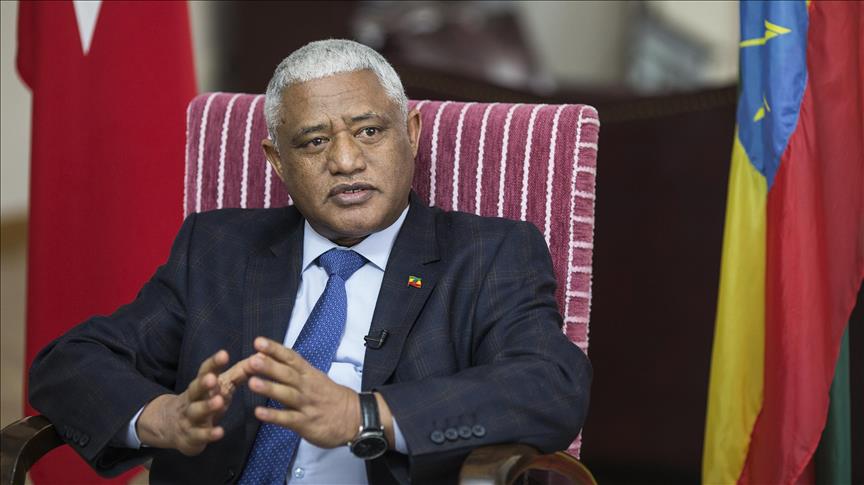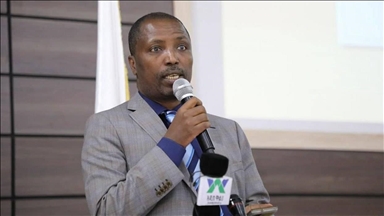 Ethiopia’s ambassador to Turkey Ayalew Gobezie ( Özge Elif Kızıl - Anadolu Ajansı )
Ethiopia’s ambassador to Turkey Ayalew Gobezie ( Özge Elif Kızıl - Anadolu Ajansı )
By Mehmet Ozturk and Satuk Bugra Kutlugun
ANKARA
Ethiopia’s ambassador to Turkey has told Anadolu Agency how Turkish investors have created more than 10,000 permanent jobs, with companies up and running in the east African nation often dubbed the “Cradle of Mankind”.
Speaking in Ankara this week, Ambassador Ayalew Gobezie pointed to a deep-rooted history between Turkey and Ethiopia which allowed the two countries to grow financially and politically.
The ambassador highlighted the beginning of relations between Ethiopia and Turkey which go back to the Ottoman Empire.
“The date goes back to 1896, when the Ottoman Empire was ruled by Sultan Abdul Hamid II and Emperor Menelik II ruled the Ethiopian Empire,” said the envoy. “The first Ottoman-Turkish consulate was opened in Ethiopia in 1912.”
Turkey’s first embassy in Sub-Saharan Africa was opened in Ethiopia in 1926.
Gobezie said: “There have been frequent visits by high-level government officials to the two sisterly countries.
“We can say that Ethiopia and Turkey have excellent bilateral relations which are characterized by ever-growing economic and political ties based on common understanding and mutual respect.”
The ambassador added that the leadership of both states were “fully committed to strengthening” already-existing bilateral relations.
Gobezie recalled the visits to Turkey by the late Prime Minister of the Federal Democratic Republic of Ethiopia Meles Zenawi in 2007 -- who died in August 2012 -- and current president Mulatu Teshome in August 2015.
Turkish President Recep Tayyip Erdogan and Economy Minister Zihat Zeybekci visited the country back in January 2015, with a number of high-level officials and business people.
“Turkish investor companies like Ayka Addis and BMET Cable, with several others, have set up various investment activities in our country,” said Gobezie.
“Currently, many Turkish companies have started their production and created more than 10,000 permanent jobs for Ethiopian citizens and their total capital reaches to $3 billion,” he added.
The envoy highlighted the country’s youthful demographic, saying half Ethiopia’s 100-million-strong population is aged between 15 and 30.
“More than 25 million children in Ethiopia are in primary schools,” Gobezie said. “Most African countries are populated by around 20 million.”
The envoy said the high proportion of young people had created a “challenge” to create jobs. Ethiopia’s unemployment rate is around 17 percent.
$400 million trade with Turkey
Gobezie also said trade-cooperation between Turkey and Ethiopia was growing and trade volume had reached over $400 million according to 2015 data.
“Our main exporting products are coffee, sesame, oil seeds, flower, spices, pulses, cereals, textile garments, leather and leather products,” said the envoy.
“Almost half of the investments that are coming to Ethiopia are made by Turkish investors,” Gobezie added. “Ethiopia benefits more from Turkey and currently needs more investment from Turkish companies."
The ambassador also stressed Ethiopia’s cultural richness, including 10 historic and cultural world heritage sites recognized by UNESCO.
“We were also awarded with ‘World Best Tourist Destination Award’ for 2015,” the envoy added, calling on Turks to visit the country.
Despite many promising aspects aside, Ethiopia -- like Turkey – is also facing a state of emergency.
In October, the state declared a state of emergency following months of anti-government protests and unrest in the Oromia region.
The envoy said domestic protests had arisen from economic issues and said the government was currently trying to take different measures.
“Given the appalling actions of the destructive forces on the lives of people, damaging investment projects and infrastructures, the government was obliged to declare the state of emergency,” Gobezie said, adding the country had been able to restore law and order.
Ambassador Gobezie said business in the country “can be conducted as usual” and a ban on diplomats traveling in the country without permission had been lifted.
Despite the unrest, Ethiopia has achieved seven of eight UN Millennium Development Goals and witnessed double-digit economic growth. Real GDP growth in Ethiopia averaged 10.9 percent between 2004 and 2014.
The country is currently developing hydro-electric, solar, wind and geothermal energy projects. It is also working on sugar, railway, road and industrial park projects with the aim of creating job opportunities for more than 1.2 million people.
Ethiopia has set itself the goal of being a middle-income country by the year 2025.
Anadolu Agency website contains only a portion of the news stories offered to subscribers in the AA News Broadcasting System (HAS), and in summarized form. Please contact us for subscription options.


